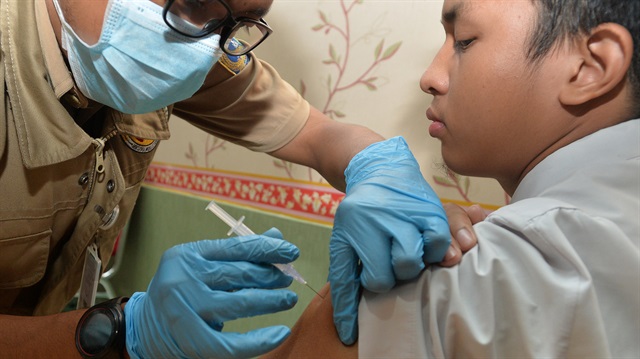
Health authorities in Jakarta kicked off a special immunisation programme on Monday to rein in an "extraordinary" outbreak of diphtheria that has sparked concerns about the Indonesian capital’s readiness to host the Asian Games next June.
Diphtheria cases have spiked 42 percent since last year, health officials say, with at least 32 deaths and more than 590 cases recorded across the archipelago, the bulk of them in densely populated Jakarta and neighbouring provinces.
"If we have an extraordinary event like this, it might mean the Asian Games would not be a success and that could become a burden for us in the health department," Jakarta governor Anies Baswedan told reporters at the programme launch.
Diphtheria is a bacterial infection that spreads through close physical contact or through the air and can be fatal. Symptoms include fever and a sore throat, and the airway can sometimes become blocked.
On Monday, dozens of mothers lined up for their toddlers to receive free jabs at a clinic in west Jakarta. The program will be rolled out to other provinces in coming weeks.
Experts said the vaccination programme was necessary and well-timed because of the risk of the disease spreading out of control at an event like the Asian Games, which is expected to draw hundreds of athletes from dozens of countries.
"Events like that have mass gatherings that make it easy for the disease to spread, so it is important now to provide as much (immunisation) coverage as possible," said Dr. Vinod Bura, the acting representative of the World Health Organisation (WHO) in Jakarta.
Worrying signs that the disease might spread included rejection of vaccinations by some people and a lack of access to healthcare, health officials and experts said.
"There are those who say (vaccination) is not good, but we must emphasize that this is beneficial," Health Minister Nila Moeloek said at the launch. "If the benefits outweigh the disadvantages, this is a necessity."
Rates of diphtheria in Indonesia are among the world’s highest, along with India and sub-Saharan African countries, even though vaccinations have helped reduce global cases over the past 30 years.
The WHO recorded about 7,000 cases around the world last year, down from 100,000 in 1980.

















